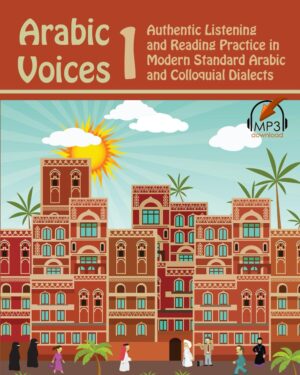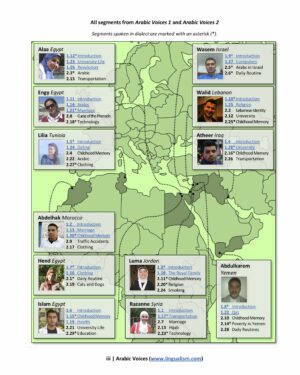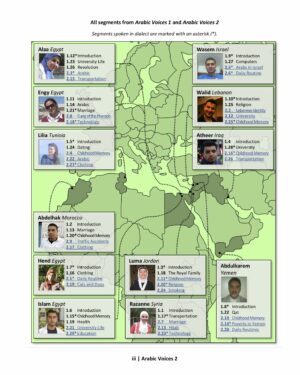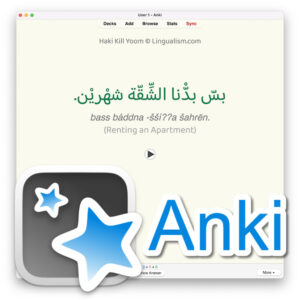Home » Modern Standard Arabic » Marriage–Razanne
Marriage–Razanne
| Greetings and welcome! [00:00.3] | السلام عليكم ورحمة الله وبركاته، أهلًا ومرحبًا بكم. | |
| Today we will talk about what Razanne said about marriage traditions in Syria, and we will comment on the different expressions she used. [00:05.2] | اليوم سنتحدّث عمّا قالته رزان بشأن تقاليد الزواج في سوريا، وسنقوم بالتعليق على ما استخدمته من عباراتٍ مختلفة. | |
| We start on page 37, specifically on line 3, where Razanne says, "I put this percentage based on my experience, and based on the people I know." [00:15.9] | ونبدأ في الصفحة السابعة والثلاثون، وتحديدًا في السطر الثالث، حيث تقول رزان: (أنا أضع هذه النسبة بُناءً على خبرتي، وبُناءً على الأشخاص الذين أعرفهم). | |
| Razanne here uses the phrase بُناءً على (based on) to say that … or to express in … in other words she says, "according to my experience" or "according to my experience." [00:31.5] | تستخدم رزان هنا عبارة [بُناءً على] لتقول أن… أو لتُعبر في… بعبارة أخرى هي تقول: (بحسب خبرتي) أو (طبقًا لخبرتي). | |
| فبُناءً على (based on) means the same thing as: according to. You can say in this statement, "I put this percentage according to my experience, and according to the people I know," or "I put this percentage according to my experience, or according to the people I know." [00:44.9] | [فبُناءً على] تعني نفس الشيء مثل: [طبقًا لـ] أو [بحسب]. فيمكنك أن تقول في هذه العبارة: (أنا أضع هذه النسبة طبقًا لخبرتي، وطبقًا للأشخاص الذين أعرفهم)، أو (أنا أضع هذه النسبة بحسب خبرتي، أو بحسب الأشخاص الذين أعرفهم). | |
| All of these mean the same thing, or both of them mean the same thing. [00:52.1] | [فبُناءً على، طبقًا لـ، بحسب]، أيًا منهما بمعنى أو كلًا منهما يعني نفس الشيء. | |
| You can say, "Based on my experience, I think this project will succeed; in my experience, I see this project will succeed; or, according to my experience, this project will succeed." [01:17.7] | يمكنك أن تقول: (بناءً على خبرتي، أنا أرى أن هذا المشروع سينجح؛ طبقًا لخبرتي، أرى أن هذا المشروع سينجح؛ أو بحسب خبرتي، أرى أن هذا المشروع سينجح). | |
| Great! We then move to line 9, where Razanne says, "As for the second category, which is the category of girls who… or who grew up in cities, for example, inside Damascus." [01:30.3] | عظيم! ننتقل بعد ذلك إلى السطر التاسع، حيث تقول رزان: (أما بالنسبة للفئة الثانية، وهي فئة الفتيات اللذين… أو اللاتي نشأن في مدن مثلًا داخل دمِشق أو داخل دمَشق). | |
| Razanne says here, "Those who grew up in cities," and نشأ (were raised) in the sense of تربى, or ترعرع or قد كبر somewhere. [01:48.0] | فتقول رزان هنا: (اللاتي نشأن في المدن)، و[نشأ] بمعنى [تربى] أو [ترعرع] أو [قد كبر] في مكان ما. | |
| You can say, "Those who grew up in the cities, or those who were brought up in the cities." Any of them have the same meaning. [02:00.6] | فيمكنك أن تقول: (اللاتي نشأن في المدن، أو اللاتي كبرن في المدن، أو اللاتي تربين في المدن)، أيًا منهما بمعنّا واحد. | |
| She says, "I grew up in this country, or I grew up in this country, or I grew up in this country," whichever of them is correct. [02:12.6] | تقول: (أنا نشأت بهذا البلد، أو أنا كبرت بهذا البلد، أو أنا تربيت بهذا البلد)، أيًا منهما صحيح. | |
| Then we move to line 12, where Razanne says, "There are some girls who prefer to finish university studies before they get married." [02:22.7] | ننتقل بعد ذلك إلى السطر الثاني عشر، حيث تقول رزان: (وهناك بعض الفتيات يفضلن أن ينهين المرحلة الدراسية الجامعية قبل أن يتزوجن). | |
| Razanne is used here قبل (before) followed by أن. [02:38.6] | وتستخدم رزان هنا [قبل]، ويليها بعد ذلك [المصدر المؤول بأن]. | |
| And we had explained that أن is the … أن and after it the present-tense verb, you use أن and after أن the present verb, so this is what we know as the interpreted source that, unlike the explicit infinitive, which is the source is the familiar form of the infinitive. [02:45.7] | وكنا قد شرحنا أن [المصدر الأول بأن] هو ال…[أن] وبعده [الفعل المضارع]، تستخدم [أن] وبعد [أن] الفعل المضارع فهذا ما نعرفه بالمصدر المؤول بأن، عكس المصدر الصريح، وهو المصدر الصيغة المتعارفة من المصدر. | |
| And after قبل (before) you must use a masdar (verbal noun) or the conjunction أن. Here you can say, "They prefer to finish university studies before they get married" or "before they get married." [03:05.3] | وبعد [قبل] لابدّ أن تستخدم المصدر الصريح أو المصدر المؤول، فهنا يمكنك أن تقول: (يفضلن أن ينهين المرحلة الدراسية الجامعية قبل الزواج) أو (قبل أن يتزوجن)، | |
| The conjunction أن... the masdar... Both are correct, but you have to use the masdar after قبل. [03:21.8] | المصدر المؤول المصدر الصحي… الصريح كلاهما صحيح، ولكن لابدّ بعد [قبل] أن تستخدم [المصدر]. | |
| Likewise, when using بعد, you must use the masdar, so if the word here is بعد, then the madar must be used after, so it says, "They prefer to finish school after they get married" or "after marriage." [03:30.8] | وكذلك عند استخدام [بعد]، فلابدّ أن تستخدم [المصدر]، فإن كانت الكلمة هنا [بعد]، فلابدّ من استخدام المصدر بعدها، فتقول: (يفضلن أن ينهين المرحلة الدراسية بعد أن يتزوجن) أو (بعد الزواج). | |
| When using قبل or بعد. The masdar has to be used after either of them. [03:48.1] | فعند استخدام [قبل] أو [بعد] لابدّ من استخدام [المصدر] بعد أيًا منهما. | |
| You say, for example... For example, "I will study before I sleep" or "before going to sleep." "I will travel after graduation" or "after I graduate." It is necessary to use the masdar. [03:55.7] | تقول مثلًا… مثلًا أن (سأذاكر قبل أن أنام) أو (قبل النوم)، (أنا سأسافر بعد التخرج) أو (بعد أن أتخرج) لابدّ من استخدام [المصدر]. | |
| Great! We then move on to line 21, where Razanne says, "As for the second type of sermon, it is the unconventional sermon of the … and it is now widespread, and it spreads more with the passage of time." [04:09.7] | عظيم! ننتقل بعد ذلك إلى السطر الواحد والعشرون، حيث تقول رزان: (أما بالنسبة للنوع الثاني من الخطبة، فهي خطبة ال… الغير تقليدية، وهي الآن منتشرة، وتنتشر أكثر مع مرور الوقت). | |
| Razanne here uses the phrase مع مرور الوقت (as time passes), which is a phrase we use often when referring to the passage of time over something. [04:27.1] | تستخدم رزان هنا عبارة [مع مرور الوقت]، وهي عبارة نستخدمها كثيرًا عند الإشارة إلى مرور زمنٍ على شيءٍ ما. | |
| مع مرور الوقت That is, 'over time.' You can say, for example, "I will improve in Arabic over time," that is, with the passage of time. "The economic situation in the country has changed over time." [04:38.3] | [مع مرور الوقت] أي مع مرور الزمن يمكنك أن تقول مثلًا: (أنا سأتحسن في اللغة العربية مع مرور الوقت) أي مع مرور الزمن، (اختلف الوضع الاقتصادي في البلد مع مرور الوقت). | |
| Great! Then we move on to line 23, where Razanne says, "After getting to know them, the engagement is the result of a love relationship between the young man and the girl." [04:57.5] | عظيم! ننتقل بعد ذلك إلى السطر الثالث والعشرون، حيث تقول رزان: (بعد التعرف بينهم، تكون الخطبة ناتجة عن علاقة حب بين الشاب والفتاة). | |
| You use the phrase ناتجة عن which is a connecting word that you can use when talking about why. [05:11.1] | تستخدم عبارة [ناتجة عن] وهي كلمة ربط يمكنك أن تستخدمها عندما تتحدّث عن السبب. | |
| Here you can say, "After getting to know them, the engagement is because of a love affair between a young man and a girl," you can use ناتجة عن or بسبب to link something with the cause that led to it. [05:20.1] | فهنا يمكنك أن تقول: (بعد التعرف بينهم الخطبة تكون بسبب علاقة حب بين الشاب والفتاة)، فيمكنك أن تستخدم [ناتجة عن] أو [بسبب] للربط بين أمرٍ ما والسبب الذي أدى إليه. | |
| For example, you can say, "Improvement in language is due to studying hard," it is due to studying hard. You can use ناتج عن or ناتجة عن to indicate the… cause. [05:40.1] | يمكنك أن تقول مثلًا: (التحسن في اللغة هو ناتج عن المذاكرة بجد)، هو بسبب المذاكرة بجد فيمكنك أن تستخدم [ناتج عن] أو [ناتجة عن] للإشارة إلى ال… سبب. | |
| You can say: "Economic progress is the result of mega projects" or "It is due to mega projects." [05:57.8] | يمكنك أن تقول: (التقدم الاقتصادي هو ناتجٌ عن المشاريع الضخمة) أو (هو بسبب المشاريع الضخمة). | |
| Great! We then move on to line 25, where Razanne says, "Often the relationships that are prevalent in Syrian society that are love relationships, we can say that they are somewhat innocent." [06:06.9] | عظيم! ننتقل بعد ذلك إلى السطر الخامس والعشرون، حيث تقول رزان: (غالبًا العلاقات المنتشرة في المجتمع السوري، هي علاقات حب تقريبًا يمكن أن نقول إنها بريئة إلى حدٍ ما). | |
| Razanne here adds at the end of the sentence the phrase إلى حدٍ ما, and this phrase you use when you say that something does not happen perfectly, you are not absolutely sure, you are not assertive, so you use the phrase إلى حدٍ ما. [06:22.2] | تُضيف رزان هنا في نهاية الجملة عبارة عبارة [إلى حدٍ ما]، و[إلى حدٍ ما] هذه العبارة تستخدمها عندما تقول أن شيئًا ما لا يحدث إلى التمام، أنت لست متأكد تمام التأكد، أنت لست جازمًا، فتستخدم عبارة [إلى حدٍ ما]. | |
| You can say, for example, "I agree with you to some extent." If you agree with someone to some extent, then this means that you do not agree completely but you only agree to some extent. "I agree with you to some extent," here Razanne says , "She is somewhat innocent." [06:43.3] | يمكنك أن تقول مثلًا: (أنا أتفق معك إلى حدٍ ما)، فإذا اتفقت مع شخصٍ ما إلى حدٍ ما، فهذا يعني أنك لا تتفق تمام الإتفاق ولكن أنت تتفق فقط إلى حدٍ ما، (أنا أوافقك الرأي إلى حدٍ ما)، هنا تقول رزان: (فهي بريئة إلى حدٍ ما). | |
| Great! We then move on to line 28 and the last point. [07:11.2] | عظيم! ننتقل بعد ذلك إلى السطر الثامن والعشرون والنقطة الأخيرة. | |
| We may have referred before to the phrase من وجهة نظري (from my point of view) or في وجهة نظري. Here Razanne says, "I am speaking from the point of view of Muslims," meaning 'for Muslims.' That is, 'from the point of view of Muslims.' [07:17.7] | ربما قد أشرنا من قبل إلى عبارة [من وجهة نظري] أو [في وجهة نظري]. هنا تقول رزان: (فأنا أتحدّث من وجهة نظر المسلمين)، أي (بالنسبة للمسلمين)، أي (في وجهة نظر المسلمين). | |
| It says من وجهة نظر, or في وجهة النظر, or بالنسبة any of these expressions meaning or expressing an opinion. [07:33.0] | تقول [من وجهة نظر]، أو [في وجهة النظر]، أو [بالنسبة] أي من هذه العبارات تعني أو تعبر عن الرأي. | |
| She says, "in my view, this book is useful; in my view this book is useful; for me this book is useful." [07:43.8] | تقول: (من وجهة نظري هذا الكتاب مفيد، في وجهة نظري هذا الكتاب مفيد، بالنسبة لي هذا الكتاب مفيد). | |
| Here, Razanne says, "from the point of view of Muslims," that is, "in the opinion of Muslims." [07:53.8] | فهنا رزان تقول: (من وجهة نظر المسلمين) أي (في رأي المسلمين). | |
| With this, we have finished commenting on what Razanne said. [08:00.6] | وبهذا نكون قد انتهينا من التعليق عمّا قالته رزان. | |
| I hope you have benefited from this video. [08:04.8] | أتمنى أن تكونوا قد استفدتم من هذا الفيديو. | |
| Thank you very much, and see you in another video. [08:08.1] | أشكركم شكرًا جزيلًا، وألقاكم في فيديو آخر. | |
| Peace, mercy and blessings of God. [08:11.5] | السلام عليكم ورحمة الله وبركاته. |
Video Lessons
Arabic Voices MSA Lessons
Arabic teacher Mostafa Ahmed takes us through segments in MSA from Lingualism's book Arabic Voices 1: Authentic Listening and Reading Practice in Modern Standard Arabic and Colloquial Dialects, explaining interesting points of grammar and vocabulary.
© 2024 Lingualism LLC










